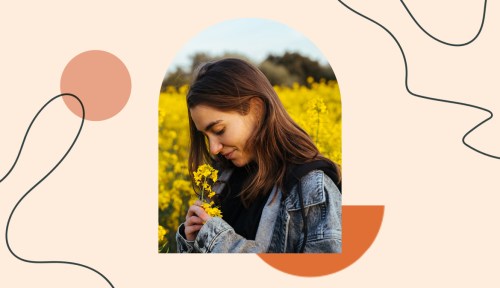It’s easy to deem sadness as an inherently negative emotion and happiness as a net positive one. But, according to experts, feeling sadness is good to a degree, and can even give way to you feeling happier because you’re more aware of and in tune with all of your real emotions.
Experts in This Article
optimism doctor and founder of optimism and happiness company Things Are Looking Up.
journalist, speaker, author
Feeling happier by way of embracing sadness is a main point of discussion in the latest episode of The Well+Good Podcast. During the chat about how to feel happier, journalist and author Helen Russell and optimism doctor Deepika Chopra, PsyD, break down why feeling sadness is good for boosting happiness.
Listen to the full episode here:
“It feels as though we’ve all been sold a very narrow definition of happiness, a definition that means never being sad or doing hard things or having difficult conversations,” Russell says. If you follow that narrow definition, you might be tempted to replace bad feelings with good ones. But repressing your sadness and attempting to replace it with happiness won’t work because sadness is a natural human response, says Russell—one we, again, benefit from embracing.
“It feels as though we’ve all been sold a very narrow definition of happiness, a definition that means never being sad or doing hard things or having difficult conversations.” —Helen Russell, author
“If we suppress our negative thoughts, we end up feeling worse,” Russell says. “And, actually, studies show that experiencing temporary sadness, and allowing ourselves to sit with those feelings when they come, can counterintuitively make us happier.”

That’s because being comfortable with feeling sadness teaches us to see negative emotions as an inevitable part of our lives, and adopting that perspective can lead you to be better equipped for how to deal when you experience sadness, making you less likely to dwell on it and more likely to deal with it and mindfully move forward. “No one is immune to feeling sadness or unhappiness,” says Dr. Chopra. “No one is immune to…things that are not going to go our way. That is actually as much part of being a human as happiness and things that do go our way.”
Ultimately, if we don’t allow room for the experience of sadness and expect to be happy all the time, we’re engaging in toxic positivity, which lends itself to an inherent sense of shame when we inevitably feel sad, adds Russell. And when we pretend we’re happy when we’re not, understanding true happiness becomes complicated to identify.
To be sure, being an optimistic, hopeful, and positive person doesn’t mean being fully happy all the time, says Dr. Chopra. And engaging with happiness works best when it comes with the understanding that life has ebbs and flows. “The biggest and most significant, meaningful, and potent form of increasing optimism is resiliency,” says Dr. Chopra. “It’s based on knowing that you can overcome what’s in front of you. It’s about seeing the struggle and the roadblocks and the setbacks and [knowing] that you will overcome it.”
So the next time you’re worried about experiencing sadness or down on yourself for not being happy in a given moment, remember that there are real reasons why feeling sadness is good. Allowing yourself to momentarily experience it can actually help you lead a happier life.
Oh hi! You look like someone who loves free workouts, discounts for cutting-edge wellness brands, and exclusive Well+Good content. Sign up for Well+, our online community of wellness insiders, and unlock your rewards instantly.
Sign Up for Our Daily Newsletter
Get all the latest in wellness, trends, food, fitness, beauty, and more delivered right to your inbox.
Got it, you've been added to our email list.











